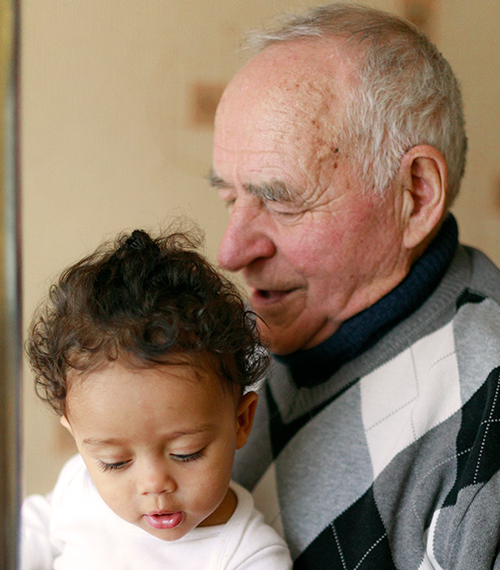6 Things to Pass On as You Number Your Days
6 Things to Pass On as You Number Your Days
“I’ll never forget the time I took Kirby to a football game and fed him a bunch of skittles and popcorn and then let him ride on my shoulder.”
So begins one of my husband’s favorite stories to retell (often at the inopportune time of dinner, given what follows—I’ll let you use your imagination to fill in the rest of the story). The kids will either nod or shake their head and say, “Yeah, we know, Dad,” or patiently listen to the thirtieth retelling of a “dad story.” Is this the kind of thing David was talking about when he promised his fellow Israelites, “Everyone will share the story of your wonderful goodness; they will sing with joy about your righteousness” (Psalm 145:7 NLT)?
In a way, it is. Because when my husband passes on favorite stories to our children, he is passing on his humility and his wisdom (about a dad who learned his lesson about feeding his child a bunch of junk food and then letting him ride on his shoulders). Some things we pass on may more directly share the story of God’s wonderful goodness, and others will more indirectly do so.
As we begin to “number our days,” to recognize that although we will live forever in the kingdom of God, our days on this earth will come to an end, we are energized to share our stories, our lives, our wisdom, and our possessions with future generations. As we’ve already mentioned in this column, we can bless our loved ones by passing on crucial information that they will need in crisis, but we can also bless them by passing on other things. As we number our days, we begin to think intentionally about what we want to share now and what we want to leave behind later. Today we’ll consider six things we might want to pass on as a way of sharing God’s wonderful goodness and singing with joy about his righteousness.
1. Pass on a particular skill or expertise that will help others.
For example, my husband is renowned in our area for his expertise at repairing the worst of the worst shoulders—fractures and tears. Before he retires, he wants to train up other surgeons who can perform these difficult operations so the hurting can get the help they need. A counseling friend wants to pass along the tools and techniques she has garnered over the years so younger counselors will not have to learn them the hard way.
2. Along that line, teach someone “how-to” do something seemingly simple but also essential or enjoyable.
It can be something as basic as how to sew, how to handle an automobile skid on icy roads, or how to make your famous rolls. I’ll never forget the first time I tried to make my grandmother’s rolls using a recipe she had shared in a church cookbook. Unfortunately, the recipe incorrectly reported the amount of milk required. With a goopy mess in my dough bowl, I called her long-distance (it was back in the day) to ask for help. I was thankful to discover the correct recipe before she died (but I still would have benefited from in-person lessons, because I never did master her rolls).
3. Share family history.
While future generations may not seem interested now, they likely will want to know more about their family one day. (On the other hand, sometimes they need to know crucial facts about family medical history now.) My history-loving aunt recently passed along a quilt believed to have been crafted by my great-great grandmother. With the quilt, she shared several typed pages describing my great-great grandmother’s Scottish heritage. My daughter-in-law, who loves history, proudly displays the quilt and has saved the story along with it.
4. Write or speak blessings.
Just as Isaac blessed Jacob before he died by telling him that nations would bow down to him (Genesis 27:27-29), we can bless our loved ones by giving them words about how they uniquely reflect the image of God and their gifts for the kingdom. Some people write letters to family members to leave behind after they’ve died. Others keep a regular practice of sharing these words, perhaps at birthdays or on special occasions. I try to write a birthday card to my loved ones each year expressing how I’ve seen the grace of God displayed in their lives.
5. Share values and wisdom.
Values and wisdom can often be expressed in what is called a spiritual legacy, “the passing of wisdom from one person to another….” (Daniel Taylor, Creating a Spiritual Legacy). As Taylor explains, values and wisdom are often best shared through significant stories. Taylor writes, “Sociologists point out that passing on wisdom is the main task of the last third of one’s life, part of the shift…from a focus on success to a focus on significance. But it can and should be done at any age. Have you learned something—even tentatively? Pass it on” (Taylor, Spiritual Legacy). My husband’s skittles story is an example of a funny story that passes on wisdom and values (what he learned and also his value of enjoying time with his children). As Taylor points out, it takes time and reflection to determine what values and wisdom we want to pass on, but the stories we share can not only point to God’s “wonderful goodness” in our lives but can strengthen the faith, hope, and love of our loved ones.
6. Pass on some valued belongings now.
Adele Calhoun, a spiritual director, writes about aging and the spiritual discipline of simplicity, “Aging has always been about simplifying and letting go. Sooner or later we realize that we can’t manage all the stuff and activity anymore. We have to let go. The practice of letting go and embracing simplicity is one way we prepare ourselves for what is to come. One day we all will have to let go of everything—even our own breath. It will be a day of utter simplicity—a day when the importance of stuff fades. Learning to live simply prepares us for our last breath while cultivating in us the freedom to truly live here and now” (Adele Calhoun, Spiritual Disciplines Handbook: Practices that Transform Us). We benefit by giving away belongings now as we enjoy seeing another enjoy it. Not using that scuba diving equipment in the garage anymore? Why not give it to a granddaughter who wants to learn how to dive? Not using that sewing machine anymore? Why not donate it to a home economics program at the local high school?
Dear friends, if we have tasted of the Lord’s goodness and known his wonderful works, we have every reason to “pass on” this goodness to others. Why not choose one of these six ways today and start sharing your legacy?
I’d love to know: what are some things you have already passed on or would like to pass on as a way of numbering your days?
Sign Up for the Organizing Your Life & Legacy Workshop
Create a legacy that will give you and your loved ones peace today and in the years to come.











![When’s the last time you highlighted your weakness?
Therefore I will boast all the more gladly in my weaknesses, so that the power of Christ may rest upon me. 2 Cor. 12:10
All-Powerful God,
We confess,
we in Western culture
crave power, control, and independence.
The last thing we want
is to seem weak.
And yet, weakness is the way of Christ,
so it must be our way as well.
The apostle Paul understood that,
so in the face of accusations
that he wasn’t an apostle,
he countered the boasting of the “super-apostles”
with some boasting of his own:
“If I must boast,
I will boast of the things
that show my weakness” (2 Cor. 11:30).
And then he mentions how he was lowered in a basket through the window of a wall in Damascus, of all places,
a place he went to persecute Jews only to be knocked down on the road,
struck blind, by his Lord and Savior himself.
Paul shares many other weaknesses in 2 Corinthians,
a book that’s all about weakness as the way
of followers of Christ.
He asked that you would relieve him from a “thorn in the flesh,”
but you did not.
Instead, you said,
“My grace is sufficient for you,
for my power is made perfect in your weakness” (2 Cor. 12:9).
Lord, we know we really are weak —
[for each of these areas, name any weaknesses you have]
weak in our bodies,
weak in our work,
weak in our wills,
weak in our faith,
weak in our hope,
weak in our love.
We believe
that you your power is made perfect
in and through our weakness.
Help our unbelief.
In Jesus’s name. Amen.
Read 2 Corinthians 11:30-12:10.
#Dailyprayer #devotional
#hopewriterlife #goodnewsfeed #votd #Biblestudy #dailydevotions #grace #dailyverse #womensministry #aging
#gospelshaped #shereadstruth #womenoftheword #christianliving](https://www.elizabethturnage.com/wp-content/plugins/instagram-feed/img/placeholder.png)